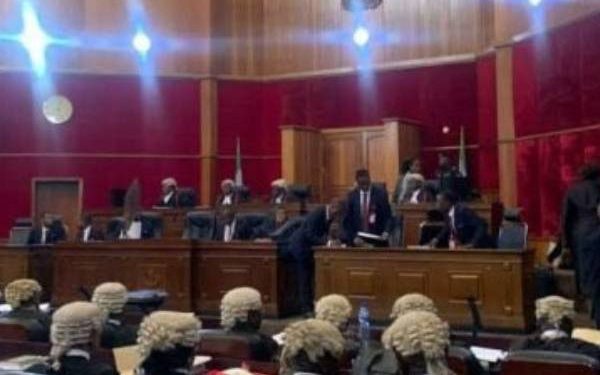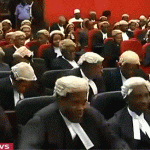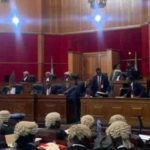The Presidential Election Petition Court held that the “Requirement of pleading are provided in paragraph 4(d) of the 1st schedule of the electoral act.
Every party to an election petition must ensure averment to its pleading.
Pleading are written statements of parties, where parties states summary of the issues to prove its case.
The pleading of the petitioner with allegations to various forms of election violations in the presidential election are vague as they were to tied to any polling unit.
There must be pleading of particulars of electoral fraud or crime.
The averment of the petitioner failed to specify the places were irregularities occurred or places where there was no election.
The petitioner alleged that their vote were reduce , they failed to show the figures deducted from their votes.
The petitioner failed to specify polling unit were they alleged over voting occurred in Niger, Ekiti and Ondo.
The petitioner failed to state the figures of unlawful voted credited to President Tinubu.
The petitioner alleged INEC had suppressed their votes in Rivers and Benue state they failed to state the figures or the polling units.
The petitioners admitted not specifying the polling unit or the figures unlawfully deducted from their votes, but will rely on the INEC spreadsheet showing results and the forensics analyses.
These documents were not pleaded by the petitioner to afford the respondents to reply.
In a presidential election held in 176,866 polling units and 774 local government areas, it would be improper not to specify where there were irregularities.
Only a political party has the right to determine the nominations of its candidates.
In the issue of non joiner of Atiku Abubakar who came 2nd in the election in the petition filed by the Labour Party, the court held that contention of an election petition is strictly between the person who lost the election and the person who wins and electoral body that conducted the election.
The petitioners introduced new facts in their response to the respondent’s reply which is in contravention of paragraph 16(1) of the Electoral Act.
The Presidential Election Petition Court held that the “Requirement of pleading are provided in paragraph 4(d) of the 1st schedule of the electoral act.
Every party to an election petition must ensure averment to its pleading.
Pleading are written statements of parties, where parties states summary of the issues to prove its case.
The pleading of the petitioner with allegations to various forms of election violations in the presidential election are vague as they were to tied to any polling unit.
There must be pleading of particulars of electoral fraud or crime.
The averment of the petitioner failed to specify the places were irregularities occurred or places where there was no election.
The petitioner alleged that their vote were reduce , they failed to show the figures deducted from their votes.
The petitioner failed to specify polling unit were they alleged over voting occurred in Niger, Ekiti and Ondo.
The petitioner failed to state the figures of unlawful voted credited to President Tinubu.
The petitioner alleged INEC had suppressed their votes in Rivers and Benue state they failed to state the figures or the polling units.
The petitioners admitted not specifying the polling unit or the figures unlawfully deducted from their votes, but will rely on the INEC spreadsheet showing results and the forensics analyses.
These documents were not pleaded by the petitioner to afford the respondents to reply.
In a presidential election held in 176,866 polling units and 774 local government areas, it would be improper not to specify where there were irregularities.
Only a political party has the right to determine the nominations of its candidates.
In the issue of non joiner of Atiku Abubakar who came 2nd in the election in the petition filed by the Labour Party, the court held that contention of an election petition is strictly between the person who lost the election and the person who wins and electoral body that conducted the election.
The petitioners introduced new facts in their response to the respondent’s reply which is in contravention of paragraph 16(1) of the Electoral Act.
The Presidential Election Petition Court held that the “Requirement of pleading are provided in paragraph 4(d) of the 1st schedule of the electoral act.
Every party to an election petition must ensure averment to its pleading.
Pleading are written statements of parties, where parties states summary of the issues to prove its case.
The pleading of the petitioner with allegations to various forms of election violations in the presidential election are vague as they were to tied to any polling unit.
There must be pleading of particulars of electoral fraud or crime.
The averment of the petitioner failed to specify the places were irregularities occurred or places where there was no election.
The petitioner alleged that their vote were reduce , they failed to show the figures deducted from their votes.
The petitioner failed to specify polling unit were they alleged over voting occurred in Niger, Ekiti and Ondo.
The petitioner failed to state the figures of unlawful voted credited to President Tinubu.
The petitioner alleged INEC had suppressed their votes in Rivers and Benue state they failed to state the figures or the polling units.
The petitioners admitted not specifying the polling unit or the figures unlawfully deducted from their votes, but will rely on the INEC spreadsheet showing results and the forensics analyses.
These documents were not pleaded by the petitioner to afford the respondents to reply.
In a presidential election held in 176,866 polling units and 774 local government areas, it would be improper not to specify where there were irregularities.
Only a political party has the right to determine the nominations of its candidates.
In the issue of non joiner of Atiku Abubakar who came 2nd in the election in the petition filed by the Labour Party, the court held that contention of an election petition is strictly between the person who lost the election and the person who wins and electoral body that conducted the election.
The petitioners introduced new facts in their response to the respondent’s reply which is in contravention of paragraph 16(1) of the Electoral Act.
The Presidential Election Petition Court held that the “Requirement of pleading are provided in paragraph 4(d) of the 1st schedule of the electoral act.
Every party to an election petition must ensure averment to its pleading.
Pleading are written statements of parties, where parties states summary of the issues to prove its case.
The pleading of the petitioner with allegations to various forms of election violations in the presidential election are vague as they were to tied to any polling unit.
There must be pleading of particulars of electoral fraud or crime.
The averment of the petitioner failed to specify the places were irregularities occurred or places where there was no election.
The petitioner alleged that their vote were reduce , they failed to show the figures deducted from their votes.
The petitioner failed to specify polling unit were they alleged over voting occurred in Niger, Ekiti and Ondo.
The petitioner failed to state the figures of unlawful voted credited to President Tinubu.
The petitioner alleged INEC had suppressed their votes in Rivers and Benue state they failed to state the figures or the polling units.
The petitioners admitted not specifying the polling unit or the figures unlawfully deducted from their votes, but will rely on the INEC spreadsheet showing results and the forensics analyses.
These documents were not pleaded by the petitioner to afford the respondents to reply.
In a presidential election held in 176,866 polling units and 774 local government areas, it would be improper not to specify where there were irregularities.
Only a political party has the right to determine the nominations of its candidates.
In the issue of non joiner of Atiku Abubakar who came 2nd in the election in the petition filed by the Labour Party, the court held that contention of an election petition is strictly between the person who lost the election and the person who wins and electoral body that conducted the election.
The petitioners introduced new facts in their response to the respondent’s reply which is in contravention of paragraph 16(1) of the Electoral Act.
The Presidential Election Petition Court held that the “Requirement of pleading are provided in paragraph 4(d) of the 1st schedule of the electoral act.
Every party to an election petition must ensure averment to its pleading.
Pleading are written statements of parties, where parties states summary of the issues to prove its case.
The pleading of the petitioner with allegations to various forms of election violations in the presidential election are vague as they were to tied to any polling unit.
There must be pleading of particulars of electoral fraud or crime.
The averment of the petitioner failed to specify the places were irregularities occurred or places where there was no election.
The petitioner alleged that their vote were reduce , they failed to show the figures deducted from their votes.
The petitioner failed to specify polling unit were they alleged over voting occurred in Niger, Ekiti and Ondo.
The petitioner failed to state the figures of unlawful voted credited to President Tinubu.
The petitioner alleged INEC had suppressed their votes in Rivers and Benue state they failed to state the figures or the polling units.
The petitioners admitted not specifying the polling unit or the figures unlawfully deducted from their votes, but will rely on the INEC spreadsheet showing results and the forensics analyses.
These documents were not pleaded by the petitioner to afford the respondents to reply.
In a presidential election held in 176,866 polling units and 774 local government areas, it would be improper not to specify where there were irregularities.
Only a political party has the right to determine the nominations of its candidates.
In the issue of non joiner of Atiku Abubakar who came 2nd in the election in the petition filed by the Labour Party, the court held that contention of an election petition is strictly between the person who lost the election and the person who wins and electoral body that conducted the election.
The petitioners introduced new facts in their response to the respondent’s reply which is in contravention of paragraph 16(1) of the Electoral Act.
The Presidential Election Petition Court held that the “Requirement of pleading are provided in paragraph 4(d) of the 1st schedule of the electoral act.
Every party to an election petition must ensure averment to its pleading.
Pleading are written statements of parties, where parties states summary of the issues to prove its case.
The pleading of the petitioner with allegations to various forms of election violations in the presidential election are vague as they were to tied to any polling unit.
There must be pleading of particulars of electoral fraud or crime.
The averment of the petitioner failed to specify the places were irregularities occurred or places where there was no election.
The petitioner alleged that their vote were reduce , they failed to show the figures deducted from their votes.
The petitioner failed to specify polling unit were they alleged over voting occurred in Niger, Ekiti and Ondo.
The petitioner failed to state the figures of unlawful voted credited to President Tinubu.
The petitioner alleged INEC had suppressed their votes in Rivers and Benue state they failed to state the figures or the polling units.
The petitioners admitted not specifying the polling unit or the figures unlawfully deducted from their votes, but will rely on the INEC spreadsheet showing results and the forensics analyses.
These documents were not pleaded by the petitioner to afford the respondents to reply.
In a presidential election held in 176,866 polling units and 774 local government areas, it would be improper not to specify where there were irregularities.
Only a political party has the right to determine the nominations of its candidates.
In the issue of non joiner of Atiku Abubakar who came 2nd in the election in the petition filed by the Labour Party, the court held that contention of an election petition is strictly between the person who lost the election and the person who wins and electoral body that conducted the election.
The petitioners introduced new facts in their response to the respondent’s reply which is in contravention of paragraph 16(1) of the Electoral Act.
The Presidential Election Petition Court held that the “Requirement of pleading are provided in paragraph 4(d) of the 1st schedule of the electoral act.
Every party to an election petition must ensure averment to its pleading.
Pleading are written statements of parties, where parties states summary of the issues to prove its case.
The pleading of the petitioner with allegations to various forms of election violations in the presidential election are vague as they were to tied to any polling unit.
There must be pleading of particulars of electoral fraud or crime.
The averment of the petitioner failed to specify the places were irregularities occurred or places where there was no election.
The petitioner alleged that their vote were reduce , they failed to show the figures deducted from their votes.
The petitioner failed to specify polling unit were they alleged over voting occurred in Niger, Ekiti and Ondo.
The petitioner failed to state the figures of unlawful voted credited to President Tinubu.
The petitioner alleged INEC had suppressed their votes in Rivers and Benue state they failed to state the figures or the polling units.
The petitioners admitted not specifying the polling unit or the figures unlawfully deducted from their votes, but will rely on the INEC spreadsheet showing results and the forensics analyses.
These documents were not pleaded by the petitioner to afford the respondents to reply.
In a presidential election held in 176,866 polling units and 774 local government areas, it would be improper not to specify where there were irregularities.
Only a political party has the right to determine the nominations of its candidates.
In the issue of non joiner of Atiku Abubakar who came 2nd in the election in the petition filed by the Labour Party, the court held that contention of an election petition is strictly between the person who lost the election and the person who wins and electoral body that conducted the election.
The petitioners introduced new facts in their response to the respondent’s reply which is in contravention of paragraph 16(1) of the Electoral Act.
The Presidential Election Petition Court held that the “Requirement of pleading are provided in paragraph 4(d) of the 1st schedule of the electoral act.
Every party to an election petition must ensure averment to its pleading.
Pleading are written statements of parties, where parties states summary of the issues to prove its case.
The pleading of the petitioner with allegations to various forms of election violations in the presidential election are vague as they were to tied to any polling unit.
There must be pleading of particulars of electoral fraud or crime.
The averment of the petitioner failed to specify the places were irregularities occurred or places where there was no election.
The petitioner alleged that their vote were reduce , they failed to show the figures deducted from their votes.
The petitioner failed to specify polling unit were they alleged over voting occurred in Niger, Ekiti and Ondo.
The petitioner failed to state the figures of unlawful voted credited to President Tinubu.
The petitioner alleged INEC had suppressed their votes in Rivers and Benue state they failed to state the figures or the polling units.
The petitioners admitted not specifying the polling unit or the figures unlawfully deducted from their votes, but will rely on the INEC spreadsheet showing results and the forensics analyses.
These documents were not pleaded by the petitioner to afford the respondents to reply.
In a presidential election held in 176,866 polling units and 774 local government areas, it would be improper not to specify where there were irregularities.
Only a political party has the right to determine the nominations of its candidates.
In the issue of non joiner of Atiku Abubakar who came 2nd in the election in the petition filed by the Labour Party, the court held that contention of an election petition is strictly between the person who lost the election and the person who wins and electoral body that conducted the election.
The petitioners introduced new facts in their response to the respondent’s reply which is in contravention of paragraph 16(1) of the Electoral Act.














